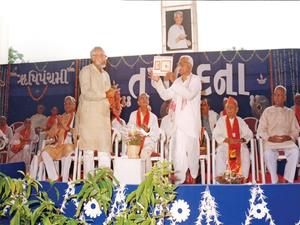
Narendra Modi's First PM House Entry Was In 2001, Not 2014: Here's The Story
According to the Modi Archive X handle, it's a lesser-known fact that Narendra Modi's first public entry into 7 Race Course Road, Delhi, did not occur in 2014 but on August 18, 2001. At that time, he held the position of BJP's national general secretary.
His visit was to launch his biography of Lakshmanrao Inamdar in the presence of then Prime Minister Atal Bihari Vajpayee. In PM Modi's book, 'Setubandh,' he likened Inamdar to the bridge constructed by Lord Ram to reach Sri Lanka.
This incident also underscores Prime Minister Narendra Modi's deep love and respect for his "Guru".
"He used to teach us always to try to discover the other person's virtues and qualities and try work on them... don't focus on the deficiencies. Each and every person has so many deficiencies, but you have to focus on his (positive) qualities," PM Modi once remarked while recalling an important lesson he had learned from his mentor and idol, Laxmanrao Inamdar.
Progress, whether for a nation, society, or individual, is impossible without the guidance of a Guru. Today, on #GuruPurnima, we celebrate the sacred bond between a guru and a disciple by remembering the indelible mark that Laxmanrao Inamdar had on his character, life, and leadership, says the Modi Archive.
At just eight years old, young Narendra Modi met Laxmanrao Inamdar, affectionately known as 'Vakil Saheb'. On the day of Diwali, instead of celebrating with his family, Modi made a life-changing decision.
He inducted himself as a 'balswayamsevak' in the RSS under Vakil Saheb's guidance. This moment marked the beginning of a lifelong journey guided by the principles and values instilled by Vakil Saheb, which would ultimately shape PM Modi's leadership and vision for the nation.
In 1970, a young Narendra Modi ventured to Ahmedabad and took up a job at his uncle's canteen in the State Transport Office. Soon after, he reconnected with Vakil Saheb at the nearby RSS headquarters, Hedgewar Bhavan.
While balancing his duties, the Bangladesh war erupted between Pakistan and India. PM Modi had then travelled to Delhi to participate in an RSS Satyagraha advocating for RSS workers' right to join the army. However, instead of being allowed to join the war effort, the Indira Gandhi government arrested Modi and his compatriots, sending them to Tihar Jail.
This pivotal event solidified Modi's political convictions and principles. Following the war's conclusion in 1972, Modi was 'adopted' by Vakil Saheb and formally joined the RSS as a 'pracharak', embarking on his journey under his mentor's guidance.
While at the Hedgewar Bhawan, Narendra Modi embraced the traditional Guru-Shishya relationship wholeheartedly. His initial lesson centered around discipline. Vakil Saheb often reminded him: "Everyone has 24 hours in a day, but it's up to them how they utilise it."
Modi's routine began at 5 a.m., starting with making tea for everyone, cleaning utensils, and preparing breakfast. His responsibilities extended to cleaning the eight to nine-room building independently, washing clothes for both himself and Vakil Saheb, and then proceeding to a volunteer's home for lunch.
Following lunch, he returned to Hedgewar Bhawan to continue his duties.
On October 16, 1984, Narendra Modi faced a profound loss with the passing of Vakil Saheb, which left a significant void in his life.
Despite this, PM Modi remained steadfast in upholding the teachings he received from his guru during his time with the RSS.
These lessons became guiding principles as he embarked on a new journey by joining the BJP in 1987.
According to Indian philosophy, every individual is born with four sacred debts, one of which is known as 'Rishi Rin'. This debt signifies the noble responsibility to transmit the wisdom and values imparted by elders and gurus to future generations.
In a tribute to Vakil Saheb's enduring wisdom and legacy, Narendra Modi established educational and cultural institutions named 'Sanskar Dham' and 'Laxman Gyanpith' on June 6, 1992, on the occasion of 'Rishi Panchami'.
Modi was steadfast in his commitment to ensuring that the teachings and values instilled by his guru would continue to inspire generations to come.
On August 23, 2001, commemorating Vakil Saheb's death anniversary, Narendra Modi orchestrated a grand event called 'Tap Vandana'.
This gathering aimed to honour the Rashtriya Swayamsevak Sangh volunteers who had reached the age of 75.
During the event, Modi unveiled a CD containing songs he had composed himself, celebrating the virtues of Vakil Saheb, which were presented as gifts to the senior volunteers.
Even as he ascended to the role of Prime Minister, Modi steadfastly upholds the teachings of Vakil Saheb.
He frequently reflects on these principles, notably highlighting them during the landmark 100th episode of 'Mann Ki Baat.' In this episode, PM Modi emphasised how 'Mann Ki Baat' has always focused on "celebrating virtues in others," a principle instilled in him by his mentor Vakil Saheb.

Legal Disclaimer:
MENAFN provides the
information “as is” without warranty of any kind. We do not accept
any responsibility or liability for the accuracy, content, images,
videos, licenses, completeness, legality, or reliability of the information
contained in this article. If you have any complaints or copyright
issues related to this article, kindly contact the provider above.


















Comments
No comment